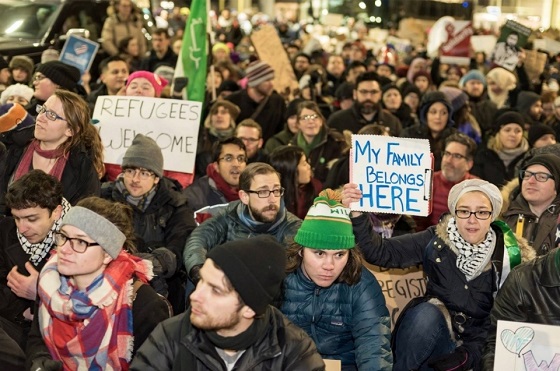
One year and three versions later, President Trump’s Muslim ban is still discriminatory, Islamophobic, and one of the most shameful examples of the racist attacks on the liberties of Muslims and immigrants in the United States.
On Jan. 27, seven days after Trump was sworn into office, he signed the Muslim ban as part of a larger slew of racist, anti-immigrant, and anti-Black executive actions. Communities across the U.S. responded immediately as people were blocked from entering the country—staging mass airport protests, organizing teach-ins and know-your-rights workshops, plastering posters across their cities, and signing petitions to stand against this immoral policy.
AFSC's Communities Against Islamophobia (CAI) project was launched to help change the dominant narrative about Islam that feeds racist policies like the Muslim ban. Since then, CAI has trained more than 700 people in five U.S. cities to become informed and active allies. Participants have taken part in mobilizations and educational events in support of the Muslim community.
Despite the Trump administration’s changes to the ban over the past year, its original intent remains the same: barring Muslims from entering the country. It’s still discriminatory and immoral.
Last week, the Supreme Court announced that it would hear Hawaii’s challenge to the current version of the ban, and a ruling is expected by June. In the meantime, the ban is in full effect, effectively barring 150 million immigrants and visitors—the vast majority of them Muslim—from Iran, Yemen, Syria, Libya, Somalia, and other countries from entering the U.S.
For numerous individuals from these countries and their families here in the U.S., the impacts of the Supreme Court decision will be severe and far reaching. As a member of the Muslim community, I have seen firsthand the devastation of a mother repeatedly being denied a visa to travel to the U.S. to be with her dying daughter.
All of us deserve to feel safe from hatred and to live and pray in peace. The Muslim Ban has no place in our society—not now, not ever.
For more resources about how you can oppose Islamophobia—and engage others in our efforts—explore our Communities Against Islamophobia resources.